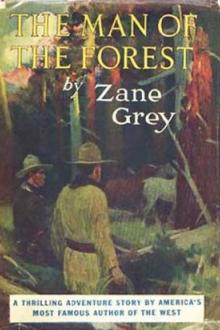The Man of the Forest by Zane Grey (read me like a book txt) 📗

- Author: Zane Grey
Book online «The Man of the Forest by Zane Grey (read me like a book txt) 📗». Author Zane Grey
Bo loved action. She had an eye for beauty, but she was not contemplative. She was now helping Dale drive the horses and hold them in rather close formation. She rode well, and as yet showed no symptoms of fatigue or pain. Helen began to be aware of both, but not enough yet to limit her interest.
A wonderful forest without birds did not seem real to her. Of all living creatures in nature Helen liked birds best, and she knew many and could imitate the songs of a few. But here under the stately pines there were no birds. Squirrels, however, began to be seen here and there, and in the course of an hour's travel became abundant. The only one with which she was familiar was the chipmunk. All the others, from the slim bright blacks to the striped russets and the white-tailed grays, were totally new to her. They appeared tame and curious. The reds barked and scolded at the passing cavalcade; the blacks glided to some safe branch, there to watch; the grays paid no especial heed to this invasion of their domain.
Once Dale, halting his horse, pointed with long arm, and Helen, following the direction, descried several gray deer standing in a glade, motionless, with long ears up. They made a wild and beautiful picture. Suddenly they bounded away with remarkable springy strides.
The forest on the whole held to the level, open character, but there were swales and stream-beds breaking up its regular conformity. Toward noon, however, it gradually changed, a fact that Helen believed she might have observed sooner had she been more keen. The general lay of the land began to ascend, and the trees to grow denser.
She made another discovery. Ever since she had entered the forest she had become aware of a fullness in her head and a something affecting her nostrils. She imagined, with regret, that she had taken cold. But presently her head cleared somewhat and she realized that the thick pine odor of the forest had clogged her nostrils as if with a sweet pitch. The smell was overpowering and disagreeable because of its strength. Also her throat and lungs seemed to burn.
When she began to lose interest in the forest and her surroundings it was because of aches and pains which would no longer be denied recognition. Thereafter she was not permitted to forget them and they grew worse. One, especially, was a pain beyond all her experience. It lay in the muscles of her side, above her hip, and it grew to be a treacherous thing, for it was not persistent. It came and went. After it did come, with a terrible flash, it could be borne by shifting or easing the body. But it gave no warning. When she expected it she was mistaken; when she dared to breathe again, then, with piercing swiftness, it returned like a blade in her side. This, then, was one of the riding-pains that made a victim of a tenderfoot on a long ride. It was almost too much to be borne. The beauty of the forest, the living creatures to be seen scurrying away, the time, distance—everything faded before that stablike pain. To her infinite relief she found that it was the trot that caused this torture. When Ranger walked she did not have to suffer it. Therefore she held him to a walk as long as she dared or until Dale and Bo were almost out of sight; then she loped him ahead until he had caught up.
So the hours passed, the sun got around low, sending golden shafts under the trees, and the forest gradually changed to a brighter, but a thicker, color. This slowly darkened. Sunset was not far away.
She heard the horses splashing in water, and soon she rode up to see the tiny streams of crystal water running swiftly over beds of green moss. She crossed a number of these and followed along the last one into a more open place in the forest where the pines were huge, towering, and far apart. A low, gray bluff of stone rose to the right, perhaps one-third as high as the trees. From somewhere came the rushing sound of running water.
“Big Spring,” announced Dale. “We camp here. You girls have done well.”
Another glance proved to Helen that all those little streams poured from under this gray bluff.
“I'm dying for a drink,” cried Bo with her customary hyperbole.
“I reckon you'll never forget your first drink here,” remarked Dale.
Bo essayed to dismount, and finally fell off, and when she did get to the ground her legs appeared to refuse their natural function, and she fell flat. Dale helped her up.
“What's wrong with me, anyhow?” she demanded, in great amaze.
“Just stiff, I reckon,” replied Dale, as he led her a few awkward steps.
“Bo, have you any hurts?” queried Helen, who still sat her horse, loath to try dismounting, yet wanting to beyond all words.
Bo gave her an eloquent glance.
“Nell, did you have one in your side, like a wicked, long darning-needle, punching deep when you weren't ready?”
“That one I'll never get over!” exclaimed Helen, softly. Then, profiting by Bo's experience, she dismounted cautiously, and managed to keep upright. Her legs felt like wooden things.
Presently the girls went toward the spring.
“Drink slow,” called out Dale.
Big Spring had its source somewhere deep under the gray, weathered bluff, from which came a hollow subterranean gurgle and roar of water. Its fountainhead must have been a great well rushing up through the cold stone.
Helen and Bo lay flat on a mossy bank, seeing their faces as they bent over, and they sipped a mouthful, by Dale's advice, and because they were so hot and parched and burning they wanted to tarry a moment with a precious opportunity.
The water was so cold that it sent a shock over Helen, made her teeth ache, and a singular, revivifying current steal all through her, wonderful in its cool absorption of that dry heat of flesh, irresistible in its appeal to thirst. Helen raised her head to look at this water. It was colorless as she had found it tasteless.
“Nell—drink!” panted Bo. “Think of our—old spring—in the orchard—full of pollywogs!”
And then Helen drank thirstily, with closed eyes, while a memory of home stirred from Bo's gift of poignant speech.
CHAPTER VII
The first camp duty Dale performed was to throw a pack off one of the horses, and, opening it, he took out tarpaulin and blankets, which he arranged on the ground under a pine-tree.
“You girls rest,” he said, briefly.
“Can't we help?” asked Helen, though she could scarcely stand.
“You'll be welcome to do all you like after you're broke in.”





Comments (0)